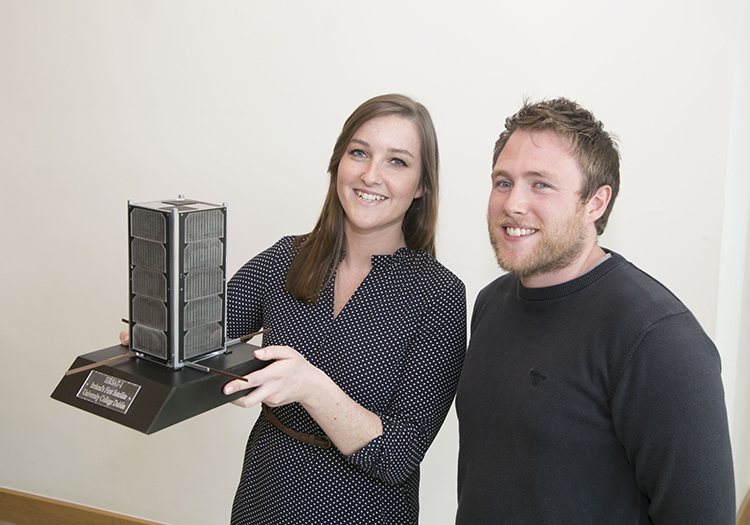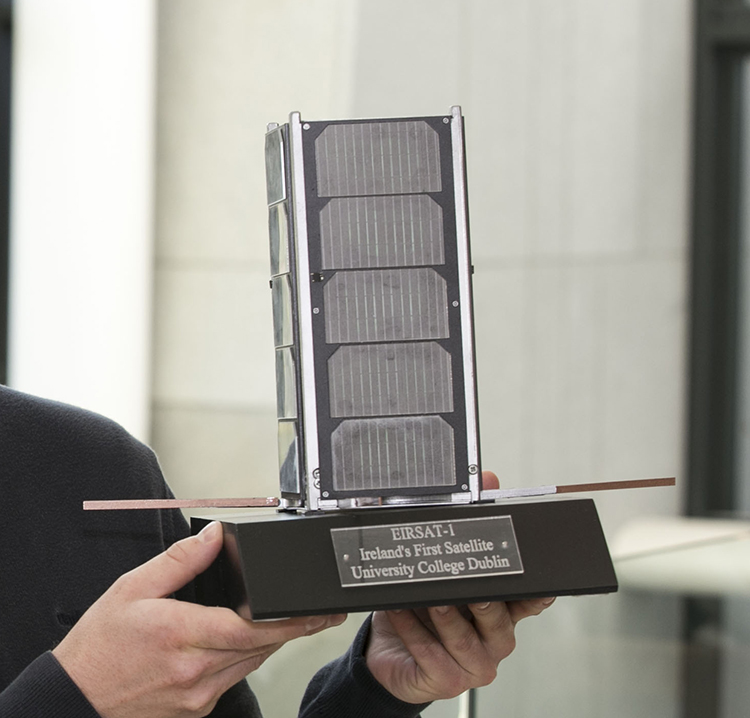News and Events
- Successful Demonstration of Hydrogen Innovation: RESR Technology Showcased on a Live Film Set
- Professor Fengzhou Fang was awarded a Prestigious Honorary Doctorate
- Dr Anna M Kelly, Appointed to the Fáilte Ireland Authority
- CDIC Automotive Design Competition 2024
- Aisling Ní Annaidh recognised as a pioneer in her field through an ERC Consolidator Award
- Scientists’ next-generation space materials blast off for tests on ISS
- SFI Industry RD&I Fellowships announced
- Inclusive XR 1.5 days Training Workshop: 17-18 June 2024
- ISRP symposium
- UCD-led space project receives over €7.9m from Disruptive Technologies Innovation Fund
- UCD Researchers awarded over €4m in ERC grants for Biomedical Engineering and Political Economy projects
- Congratulations to Xinhui Wang win the first prizes at the 26th Sir Bernard Crossland Symposium in all-Ireland (Republic of Ireland + Northern Ireland)
- ERC Starting Grants Awarded to UCD Researchers in Humanities and Engineering
- UCD's Livija Vasilenkaite - First Prize Winner #ThisIsEngineering2023
- College researchers recognised in UCD Research Impact Competition
- UCD Graduate Clíodhna Lyons named Automotive News Europe Rising Star
- Irish Government invests in 47 projects to engage and inspire the public about STEM
- Research to Literally Get Under the Skin of Things
- IMI project Screen4Care to speed up diagnosis and enhance healthcare for rare disease patients
- €9M joint investment for US-Ireland R&D Programme
- Helping People Understand and Mitigate the Spread of Aerosol-Born Infections
- Research teams chosen to find disruptive ideas for Irish Defence Forces
- Reducing the operational requirements of wind turbines with real-time downtime detection
- 2021 Archive
- 2020 Archive
- 2019 Archive
- 2018 Archive
- Arup Scholarship Awards Ceremonies 2018
- Maxim Donates Unique Robotic Learning Factory to University College Dublin
- Irish researchers win first prize in global 3D printing competition
- UCD Engineers Tech start-up CALT Dynamics selected for TechStars US accelerator
- University College Dublin Wins 2018 Knowledge Transfer Ireland Impact Award
- 21st Sir Bernard Crossland Symposium
- SMARTlab PhD alumna Dr Jacki Morie is hailed internationally as a top leader in VR/AR for the future!
- UCD named partner in major new EU manufacturing consortium
- Intel awards bursaries and employee mentors to 16 UCD graduate students
- The ESB Inter-Colleges Challenge
- Children encouraged to delve into STEM as Science Apprentice series returns
- Minister launches €22 million SFI research centre focused on advanced manufacturing
- Countdown to lift-off for UCD scientists making Ireland’s first satellite
- 2017 Archive
- 2016 Archive
Countdown to lift-off for UCD scientists making Ireland’s first satellite
Tuesday, 25 September, 2018

Maeve Doyle, PhD student, UCD School of physics research and development with Joe Thompson, PhD student, UCD school of mechanical and materials engineering
- EIRSAT-1 will be the first ever satellite designed and developed by an Irish team.
- A team of 16 UCD scientists are working on the prototype.
- The nanosatellite will launch in 2020 and will carry three different scientific experiments on board.
Ireland's first ever satellite is one step closer to taking flight after University College Dublin scientists completed work on a prototype for the European Space Agency.
(opens in a new window)EIRSAT-1, a miniature satellite, has already passed the first phase of testing and now the team are working on finalising their design for launch.
Subject to further mission milestones, the satellite will be delivered to the ESA in mid-2020 with three scientific experiments on board.
The team at UCD includes 16 students from the schools of physics, mathematics and statistics, as well as various engineering disciplines.
With a budget of €1.5m, the project is being funded by the Irish Research Council, Department of Business, Enterprise and Innovation, Science Foundation Ireland and the ESA.
Research and Development Minister John Halligan said that the project was showcased Ireland’s increasing science and technology capabilities.
“EIRSAT-1 provides the UCD student team with a great opportunity to develop skills in satellite development, a first in Irish space science education."
He added: “The development of these skills will have an impact beyond those directly participating in the project, including in the expanding space industry sector in Ireland.”
Congratulations to all members of the (opens in a new window)@EIRSAT1 team, including 7 scholars funded by (opens in a new window)@IrishResearch and former awardees (opens in a new window)@SheilaMcBreen and (opens in a new window)@dj_mckeown, who will build Ireland’s first satellite! What an exciting achievement! (opens in a new window)@ucddublin (opens in a new window)#LoveIrishResearch: (opens in a new window)https://t.co/bMouCaYQtj (opens in a new window)pic.twitter.com/bqN0SoHcn3
— IrishResearchCouncil (@IrishResearch) (opens in a new window)September 24, 2018
The UCD project was chosen to be part of the second cycle of (opens in a new window)ESA’ Fly Your Satellite programme in May 2017.
The development programme aims to inspire the next generation of scientists and engineers with the chance to build CubeSats – nanosatellites that can fit in your hand but are fully operational – and send them into space.
Joe Thompson, a PhD student at the UCD School of Mechanical and Materials Engineering, said it was a dream come true to work on EIRSAT-1.
"Especially with amazing people from so many different disciplines, and to help make history with them by building and launching Ireland's first satellite.”
We’re delighted to have welcomed Minister John Halligan TD (opens in a new window)@EnterInnov to (opens in a new window)@ucdscience today to mark the success of the first stage of the EIRSAT-1 mission - the Critical Design Review. Now we move onto building and testing Ireland’s first satellite! Thanks to all our supporters! (opens in a new window)pic.twitter.com/caj78E3OAV
— EIRSAT-1 (@EIRSAT1) (opens in a new window)September 24, 2018
The main experiment on-board EIRSAT-1 will be a gamma-ray detector, which will detect gamma-ray bursts, the most energetic explosions in the universe.
The second experiment is an in-flight demonstration of thermal control coatings developed by Irish company ENBIO, a graduate of NovaUCD.
The third experiment, called wave-based control, tests an UCD-developed algorithm to control the movement of the satellite.

A model of the EIRSAT-1 nanosatellite being worked on by a UCD team
EIRSAT-1 Project Leader (opens in a new window)Professor Lorraine Hanlon, from the UCD School of Physics, said satellites like EIRSAT-1 were disrupting the traditional space sector globally, providing a fast and cost effective route to gaining spaceflight heritage.
Professor Orla Feely, UCD Vice-President for Research, Innovation and Impact added: “A key objective of the EIRSAT-1 mission is through its success to inspire the next generation of students to study STEM subjects.”
“The skills base and the research and development agenda are closely aligned, and both need continuing investment by Government to ensure that Ireland can maximise its return from global opportunities in the space sector.”
After launching, EIRSAT-1 is anticipated to remain in orbit for up to 12-months, during which time it will communicate data to Earth through a ground radio station located at mission control in the UCD School of Physics.
By: David Kearns, Digital Journalist / Media Officer, UCD University Relations